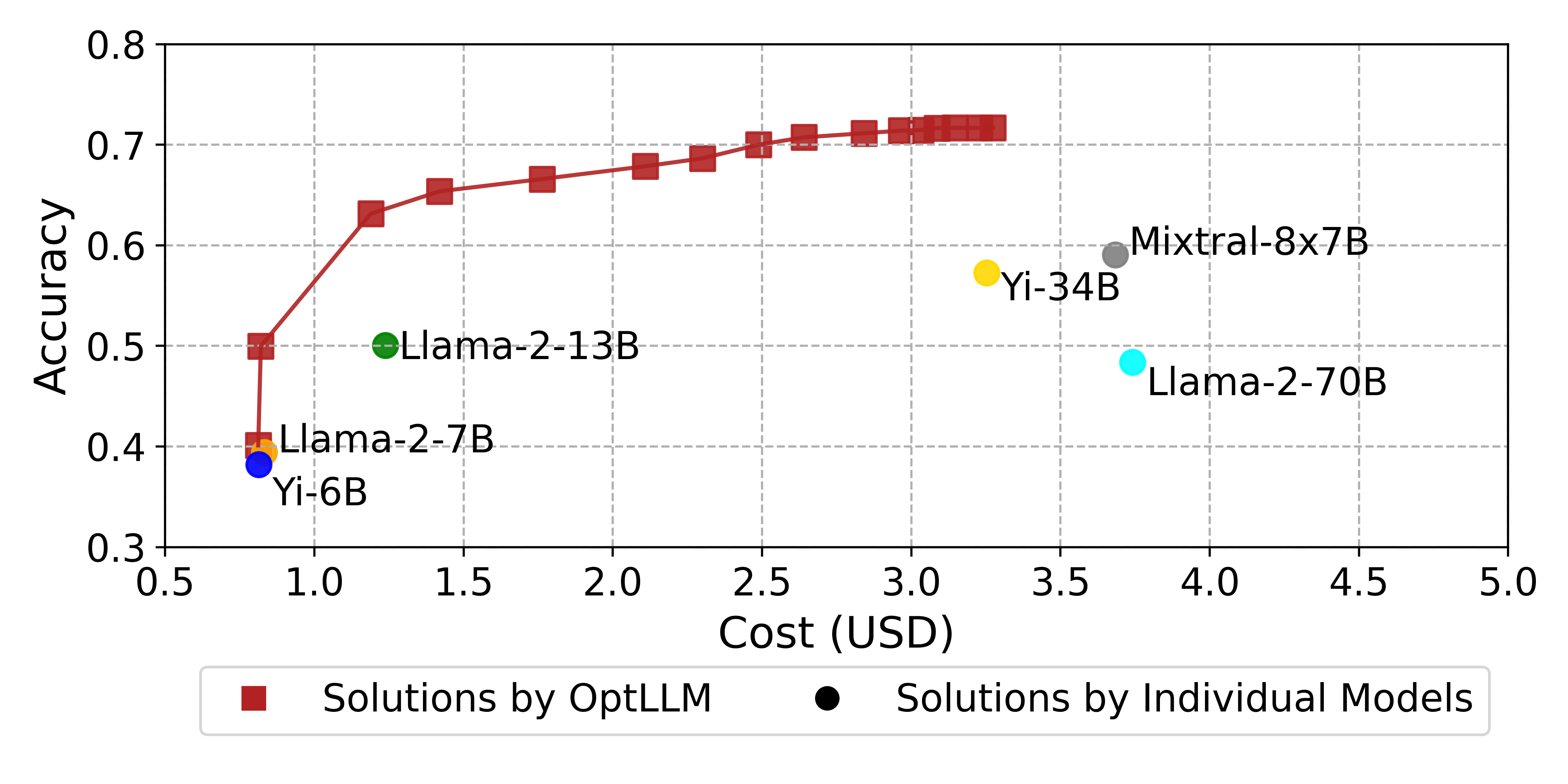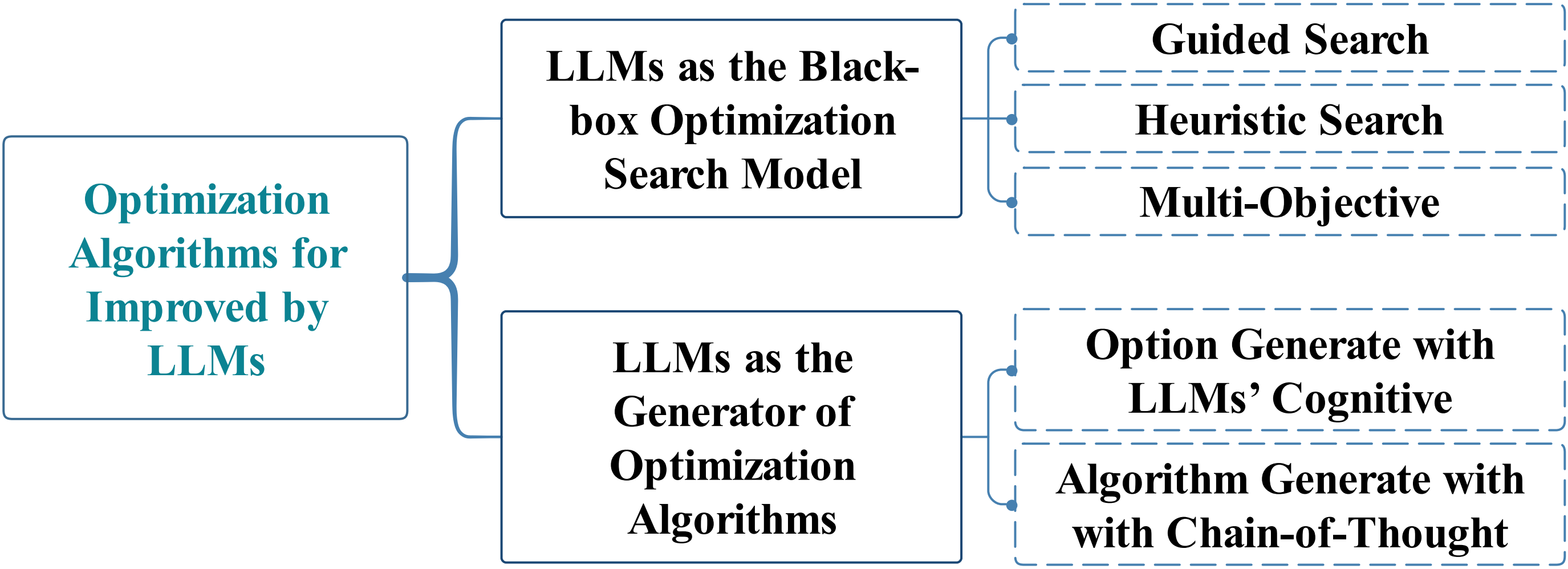OptLLM: Optimal Assignment of Queries to Large Language Models
2405.15130

0
0

Abstract
Large Language Models (LLMs) have garnered considerable attention owing to their remarkable capabilities, leading to an increasing number of companies offering LLMs as services. Different LLMs achieve different performance at different costs. A challenge for users lies in choosing the LLMs that best fit their needs, balancing cost and performance. In this paper, we propose a framework for addressing the cost-effective query allocation problem for LLMs. Given a set of input queries and candidate LLMs, our framework, named OptLLM, provides users with a range of optimal solutions to choose from, aligning with their budget constraints and performance preferences, including options for maximizing accuracy and minimizing cost. OptLLM predicts the performance of candidate LLMs on each query using a multi-label classification model with uncertainty estimation and then iteratively generates a set of non-dominated solutions by destructing and reconstructing the current solution. To evaluate the effectiveness of OptLLM, we conduct extensive experiments on various types of tasks, including text classification, question answering, sentiment analysis, reasoning, and log parsing. Our experimental results demonstrate that OptLLM substantially reduces costs by 2.40% to 49.18% while achieving the same accuracy as the best LLM. Compared to other multi-objective optimization algorithms, OptLLM improves accuracy by 2.94% to 69.05% at the same cost or saves costs by 8.79% and 95.87% while maintaining the highest attainable accuracy.
Create account to get full access
Overview
- This paper presents OptLLM, a framework for optimally assigning queries to large language models (LLMs) to balance performance and cost.
- OptLLM uses multi-objective optimization to find the best assignment of queries to LLMs, considering factors like model performance, inference latency, and cloud costs.
- The authors evaluate OptLLM on real-world datasets and show it can significantly improve the cost-performance tradeoff compared to baseline approaches.
Plain English Explanation
Large language models (LLMs) like GPT-3 and BERT have become incredibly powerful tools for a wide range of natural language processing tasks. However, using these models can be quite expensive, especially for companies or organizations with limited budgets.
The key idea behind OptLLM is to find the optimal way to assign different queries or tasks to the available LLMs. This involves balancing factors like the expected performance of each model on a given task, the latency (how long it takes to get a response), and the overall cost of using the models.
The authors use a technique called multi-objective optimization to systematically explore different assignment strategies and find the one that provides the best trade-off between performance and cost. This allows users to get high-quality results from LLMs without breaking the bank.
For example, imagine you're running a chatbot that needs to handle a variety of user questions. Some questions might be better suited for a more powerful (but more expensive) LLM, while simpler queries could be handled by a cheaper model without sacrificing too much accuracy. OptLLM would automatically figure out the optimal way to route these queries to different LLMs to minimize your overall costs while still delivering great results.
Technical Explanation
The OptLLM framework formulates the problem of assigning queries to LLMs as a multi-objective optimization problem. The key objectives are to:
- Maximize the overall performance of the system, as measured by metrics like accuracy or F1 score.
- Minimize the total cost of using the LLMs, which includes factors like cloud compute and storage fees.
- Minimize the latency (inference time) of responding to queries.
The authors model the performance, cost, and latency of each LLM as functions of the input query characteristics. They then use a multi-objective optimization algorithm to find the Pareto-optimal assignments of queries to LLMs, which represent the best trade-offs between the competing objectives.
In their experiments, the authors evaluate OptLLM on real-world datasets and compare it to baseline approaches like random assignment and greedy heuristics. They show that OptLLM can significantly improve the cost-performance trade-off, enabling users to get high-quality results at a lower overall cost.
The OptLLM framework builds on prior work in areas like efficient large language models, hybrid LLM architectures, and black-box optimization to tackle the important problem of cost-effective LLM deployment.
Critical Analysis
The authors of OptLLM provide a thorough evaluation of their approach and acknowledge several limitations and areas for further research. One key limitation is that their performance and cost models rely on simplifying assumptions and may not capture the full complexity of real-world LLM deployment scenarios.
Additionally, the authors only consider a single type of task (natural language processing) and do not explore how OptLLM might generalize to other domains that use LLMs, such as computer vision or speech recognition. Further research is needed to understand the broader applicability of the OptLLM framework.
Another area for potential improvement is the optimization algorithm used in OptLLM. While the authors demonstrate the effectiveness of their multi-objective approach, there may be opportunities to explore more advanced techniques from the cost-performance optimization literature to further improve the trade-offs found by the system.
Overall, the OptLLM paper presents an important contribution to the growing body of research on efficiently deploying and using large language models. The authors have identified a critical problem and proposed a promising solution, which could have significant practical implications for organizations seeking to leverage the power of LLMs in a cost-effective manner.
Conclusion
The OptLLM framework developed in this paper addresses the key challenge of optimally assigning queries to large language models to balance performance and cost. By formulating the problem as a multi-objective optimization task, the authors demonstrate how to systematically explore the trade-offs and find the best assignment strategies.
The promising results shown in the paper suggest that OptLLM could be a valuable tool for organizations looking to harness the power of LLMs in a cost-effective way. As the use of these models continues to grow, approaches like OptLLM will become increasingly important for ensuring that the benefits of LLMs are accessible to a wide range of users and use cases.
This summary was produced with help from an AI and may contain inaccuracies - check out the links to read the original source documents!
Related Papers

Towards Optimizing with Large Language Models
Pei-Fu Guo, Ying-Hsuan Chen, Yun-Da Tsai, Shou-De Lin

0
0
In this work, we conduct an assessment of the optimization capabilities of LLMs across various tasks and data sizes. Each of these tasks corresponds to unique optimization domains, and LLMs are required to execute these tasks with interactive prompting. That is, in each optimization step, the LLM generates new solutions from the past generated solutions with their values, and then the new solutions are evaluated and considered in the next optimization step. Additionally, we introduce three distinct metrics for a comprehensive assessment of task performance from various perspectives. These metrics offer the advantage of being applicable for evaluating LLM performance across a broad spectrum of optimization tasks and are less sensitive to variations in test samples. By applying these metrics, we observe that LLMs exhibit strong optimization capabilities when dealing with small-sized samples. However, their performance is significantly influenced by factors like data size and values, underscoring the importance of further research in the domain of optimization tasks for LLMs.
5/28/2024

When Large Language Model Meets Optimization
Sen Huang, Kaixiang Yang, Sheng Qi, Rui Wang

0
0
Optimization algorithms and large language models (LLMs) enhance decision-making in dynamic environments by integrating artificial intelligence with traditional techniques. LLMs, with extensive domain knowledge, facilitate intelligent modeling and strategic decision-making in optimization, while optimization algorithms refine LLM architectures and output quality. This synergy offers novel approaches for advancing general AI, addressing both the computational challenges of complex problems and the application of LLMs in practical scenarios. This review outlines the progress and potential of combining LLMs with optimization algorithms, providing insights for future research directions.
5/17/2024

RouteLLM: Learning to Route LLMs with Preference Data
Isaac Ong, Amjad Almahairi, Vincent Wu, Wei-Lin Chiang, Tianhao Wu, Joseph E. Gonzalez, M Waleed Kadous, Ion Stoica

0
0
Large language models (LLMs) exhibit impressive capabilities across a wide range of tasks, yet the choice of which model to use often involves a trade-off between performance and cost. More powerful models, though effective, come with higher expenses, while less capable models are more cost-effective. To address this dilemma, we propose several efficient router models that dynamically select between a stronger and a weaker LLM during inference, aiming to optimize the balance between cost and response quality. We develop a training framework for these routers leveraging human preference data and data augmentation techniques to enhance performance. Our evaluation on widely-recognized benchmarks shows that our approach significantly reduces costs-by over 2 times in certain cases-without compromising the quality of responses. Interestingly, our router models also demonstrate significant transfer learning capabilities, maintaining their performance even when the strong and weak models are changed at test time. This highlights the potential of these routers to provide a cost-effective yet high-performance solution for deploying LLMs.
7/2/2024
💬
Efficient Large Language Models: A Survey
Zhongwei Wan, Xin Wang, Che Liu, Samiul Alam, Yu Zheng, Jiachen Liu, Zhongnan Qu, Shen Yan, Yi Zhu, Quanlu Zhang, Mosharaf Chowdhury, Mi Zhang

0
0
Large Language Models (LLMs) have demonstrated remarkable capabilities in important tasks such as natural language understanding and language generation, and thus have the potential to make a substantial impact on our society. Such capabilities, however, come with the considerable resources they demand, highlighting the strong need to develop effective techniques for addressing their efficiency challenges. In this survey, we provide a systematic and comprehensive review of efficient LLMs research. We organize the literature in a taxonomy consisting of three main categories, covering distinct yet interconnected efficient LLMs topics from model-centric, data-centric, and framework-centric perspective, respectively. We have also created a GitHub repository where we organize the papers featured in this survey at https://github.com/AIoT-MLSys-Lab/Efficient-LLMs-Survey. We will actively maintain the repository and incorporate new research as it emerges. We hope our survey can serve as a valuable resource to help researchers and practitioners gain a systematic understanding of efficient LLMs research and inspire them to contribute to this important and exciting field.
5/24/2024